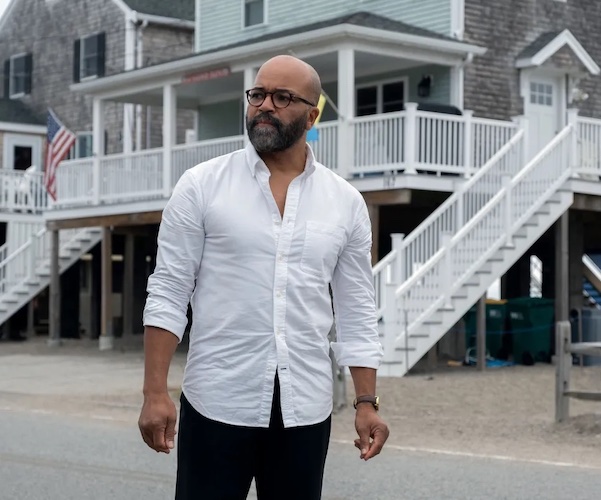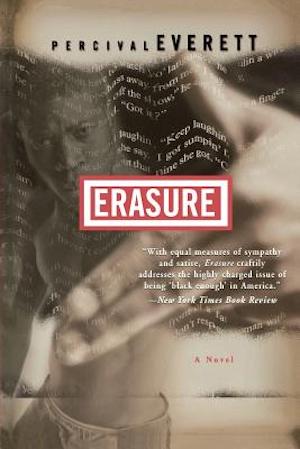Film Review: “American Fiction” — Pinned Down by Blackness
By Gerald Peary
In this promising filmmaking debut of Cord Jefferson, we’re given a too-rare peek in cinema into upper-middle-class African-American life.
American Fiction, directed by Cord Jefferson. Screening at the Brattle Theatre on December 13 and at Coolidge Corner Theatre beginning December 22.

Jeffrey Wright as “Monk” Ellison in American Fiction.
Percival Everett, author of 22 books and an English professor at USC, balks at being pinned down by his Blackness. “I’ve been called a Southern writer, a Western writer, an experimental writer, and I find it all kind of silly,” he’s said. “I write fiction.” For his acclaimed 2001 novel, Erasure, Everett created a comic alter ego, “Monk” Ellison, who likewise cringes at being categorized as an African-American novelist. His last book, far afield from the work of James Baldwin or Toni Morrison, is a reenvisioning in fiction of a drama by Aeschylus. When Ellison delivers a paper at an academic conference (the abstruse text of this speech is included in Erasure), it’s Eurocentric literary theory, a deconstruction of Roland Barthes in a playfully Barthesian way.
Meanwhile, Ellison’s newest novel is passed on by every publishing house. The verdict is that the book just won’t sell because “it’s not Black enough.” At the same time, the hottest Black novel about, the hugest best-seller, is a tome penned by an educated woman writer called We’s Lives in Da Ghetto. Ellison is so distressed by this pained simulation of inner-city Black patois that, on a lark, he concocts his own from-the-hood novel. Spoiler alert, though you can guess what happens. Ellison’s blaxploitation parody, My Pafology, is embraced by the publishing world. Like the surprised protagonists of Mel Brooks’s The Producers, “Monk” Ellison creates an accidental smash hit. A best-seller with Hollywood legs.
Though peppered with clever literary games, Erasure also offers a straightforward realist telling of Ellison’s nonliterary life. We learn that he comes from a several-generation clan of doctors, that he has a difficult relationship with his sister and brother, also physicians, and that his elderly mother is suffering from the initial symptoms of Alzheimer’s. This is where American Fiction, the new film version of Erasure, wisely concentrates most of its energy, with the travails of the Ellison family. The story of the mother is expanded, an excellent decision considering she is played by the queenly, elegant Leslie Uggams. And Ellison’s quickly cutoff romance in the book with an attractive neighbor (a charming Erika Alexander) is allowed in the movie to run its course. In this promising filmmaking debut of Cord Jefferson, we’re given a too-rare peek in cinema into upper-middle-class African-American life. There are scenes situated at a wealthy Black summer beach resort modeled, I believe, after Oak Bluffs on Martha’s Vineyard.
 On the other hand, there’s probably too much attention paid to Clifford (Sterling Brown), Ellison’s newly “out” younger brother. Director-writer Jefferson tries to be sympathetic to Clifford’s struggles with his sexuality, but the scenes that feature Clifford’s new sissy, shallow gay community read a bit homophobic. And this is irritating: in the novel, Ellison’s sister is a doctor specializing in abortions. In the movie, she’s just a doctor. Movie-making cowardice.
On the other hand, there’s probably too much attention paid to Clifford (Sterling Brown), Ellison’s newly “out” younger brother. Director-writer Jefferson tries to be sympathetic to Clifford’s struggles with his sexuality, but the scenes that feature Clifford’s new sissy, shallow gay community read a bit homophobic. And this is irritating: in the novel, Ellison’s sister is a doctor specializing in abortions. In the movie, she’s just a doctor. Movie-making cowardice.
How would American Fiction translate to the screen the clever 60-page sampling in Percival Everett’s book of pages from My Pafology, the hard times in the streets of a gun-loving homeboy? I was anticipating that the narrative would be interrupted, as it should be, by the inclusion of some over-the-top episodes from a faux Black genre film. Unfortunately, American Fiction opts for a thin scene with two pop-up Black characters standing in Ellison’s living room and mouthing lines as the seated author types them. Not much, not much. As for the novel’s metafiction, it’s held off in the movie until it takes over the final scene, a self-conscious substitute for an equally unsatisfying finish for the novel.
Fortunately, all is OK with Jeffrey Wright. The protean actor, balding with a beard and glasses, is properly fussy and abrasive and perennially dissatisfied as “Monk” Ellison. And also persuasively intellectual. There’s a fine scene in a classroom in which Ellison puts on the blackboard the title of a short story he much admires, Flannery O’Connor’s “The Artificial Nigger,” and it so offends a white female student that she flees his classroom. At a meeting with cancel-culture liberal faculty, Ellison is unrepentant at having not created a safe space for his triggered student. For that, this ex-professor says, “Hurrah!”
Gerald Peary is a Professor Emeritus at Suffolk University, Boston; ex-curator of the Boston University Cinematheque; and the general editor of the “Conversations with Filmmakers” series from the University Press of Mississippi. A critic for the late Boston Phoenix, he is the author of nine books on cinema; writer-director of the documentaries For the Love of Movies: The Story of American Film Criticism and Archie’s Betty; and a featured actor in the 2013 independent narrative Computer Chess. His latest feature documentary, The Rabbi Goes West, co-directed by Amy Geller, has played at film festivals around the world.

